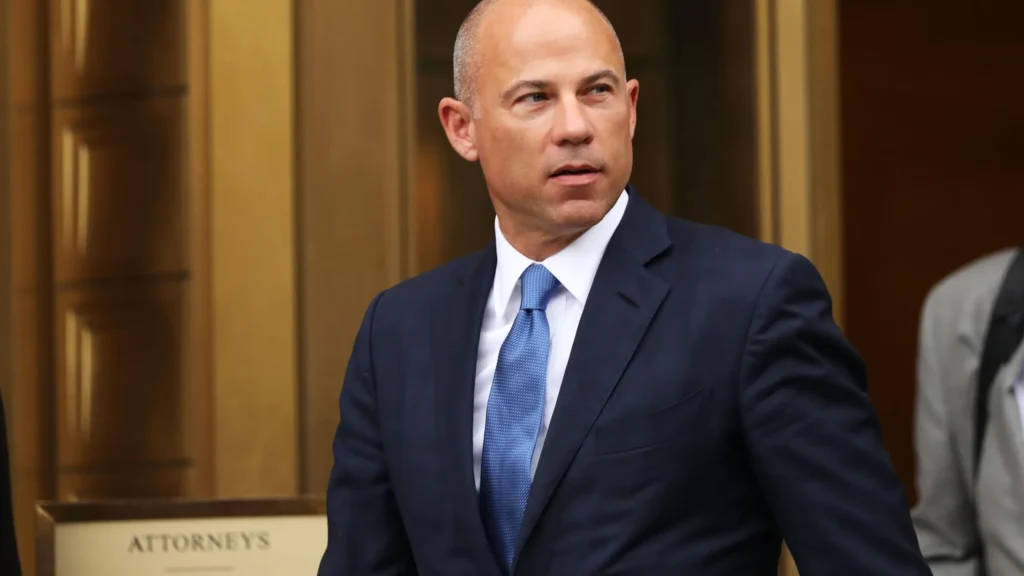
for his brash personality and high-profile cases, Avenatti emerged as a prominent attorney representing several high-profile clients, including adult film star Stormy Daniels in her legal battles against former President Donald Trump. However, his career took a dramatic turn as he became embroiled in a series of legal troubles of his own, leading to multiple criminal convictions. This article aims to explore Avenatti’s rise to fame, his controversial career, and the subsequent fall from grace that has marked his life over the past few years.
Early Life and Education
Born on February 16, 1971, in Sacramento, California, Michael Avenatti grew up in a middle-class family. His father was a former probation officer, and his mother worked as a homemaker. Avenatti attended the University of California, Irvine, where he earned a Bachelor of Arts degree in Political Science in 1996. He later pursued a law degree at George Washington University Law School, graduating in 2000.
Avenatti’s early career included stints at prestigious law firms and his own practice, where he specialized in representing clients in business disputes and personal injury cases. His ambition and charisma helped him build a reputation as a skilled litigator, but his aggressive tactics also earned him detractors.
Rise to Fame
Avenatti first gained widespread media attention in 2018 when he represented Stormy Daniels, whose real name is Stephanie Clifford, in her lawsuit against Donald Trump. Daniels alleged that she had an affair with Trump in 2006 and was subsequently paid $130,000 in hush money by Trump’s former attorney, Michael Cohen, just before the 2016 presidential election. Avenatti’s legal strategy revolved around exposing the alleged illegalities surrounding this payment, arguing that it constituted a violation of campaign finance laws.
Avenatti’s outspoken nature and ability to command media attention made him a frequent guest on news programs and a polarizing figure in the political landscape. He often criticized Trump, painting him as a liar and a criminal. His high-profile representation of Daniels not only catapulted him to national fame but also positioned him as a potential presidential candidate in the eyes of some political observers.
The Legal Battles
Avenatti’s representation of Daniels led to several legal battles, including a defamation lawsuit against Trump. The case stemmed from Trump’s tweets, which Avenatti claimed were false and damaging to his client’s reputation. Avenatti also pursued a lawsuit against the Trump campaign for allegedly colluding to suppress Daniels’ story.
While Avenatti was lauded by some as a fearless advocate for women’s rights, particularly in the context of the #MeToo movement, his aggressive tactics and relentless media presence drew criticism from others. Some legal analysts questioned his motives, suggesting that he was more interested in self-promotion than in the pursuit of justice.
Avenatti’s Personal Life
Despite his professional success, Avenatti’s personal life has been fraught with challenges. He has been married twice and has two children. His first marriage, to an unnamed woman, ended in divorce, and he later married Lisa Storie-Avenatti in 2011. Storie-Avenatti filed for divorce in 2017, and the couple’s separation was marred by allegations of domestic abuse and financial mismanagement.
Avenatti’s tumultuous personal life was often scrutinized in the media, adding to the complexities of his public persona. As he garnered more attention, questions about his character and integrity began to arise, foreshadowing the troubles that would later plague his career.
Criminal Convictions
As Avenatti’s profile rose, so too did the scrutiny of his business practices. In March 2019, he was arrested on charges of extortion and wire fraud. Federal prosecutors accused him of attempting to extort up to $25 million from Nike by threatening to reveal damaging information about the company. According to prosecutors, Avenatti demanded that Nike hire him to conduct an internal investigation, effectively leveraging his relationship with the media to coerce the company into compliance.
In addition to the extortion charges, Avenatti faced allegations of misappropriating client funds. In one case, he was accused of stealing nearly $300,000 from Daniels, funds that were meant to cover her book advance. Avenatti denied the allegations, asserting that he had acted within the bounds of the law. However, his defense was undermined by the mounting evidence against him.
In February 2022, Avenatti was found guilty of wire fraud and aggravated identity theft in a separate case involving his former clients. He was sentenced to 14 years in prison, adding to the 20 years he was already facing for the earlier charges related to Nike and his embezzlement from Daniels.
Legal Consequences
Avenatti’s legal troubles serve as a cautionary tale about the potential pitfalls of fame and ambition in the legal profession. While he initially gained notoriety as a champion for justice, his fall from grace underscores the importance of ethical conduct and integrity in the practice of law. Avenatti’s actions not only harmed his clients but also tarnished the reputation of the legal profession as a whole.
The legal battles he faced also raised questions about the role of attorneys in high-profile cases. Avenatti’s aggressive approach and willingness to engage with the media brought attention to issues that some may have preferred to keep hidden. However, his subsequent legal issues also highlighted the risks associated with such a combative style, particularly when it leads to unethical behavior.
Media Presence and Public Perception
Avenatti’s relationship with the media has been complex and multifaceted. Initially, he embraced the spotlight, appearing on various news programs and engaging with reporters. His charisma and ability to articulate his arguments made him a compelling figure in the eyes of the public.
However, as his legal troubles mounted, Avenatti’s media presence became increasingly controversial. Critics argued that he was using his platform to deflect attention from his own legal issues, painting himself as a victim of a political witch hunt. Some media outlets began to distance themselves from him, emphasizing the need for ethical conduct in legal representation.
Despite the negative press, Avenatti remained defiant. He often took to social media to share his thoughts on the political landscape and the legal system, presenting himself as a warrior for justice. His rhetoric resonated with some supporters who saw him as a champion of the underdog, while others viewed him as a self-serving opportunist.
The Impact of Avenatti’s Fall
Michael Avenatti’s dramatic fall from grace has had significant implications for the legal profession and the broader political landscape. His story raises important questions about the ethics of legal representation, the responsibilities of attorneys, and the potential consequences of seeking fame and notoriety in the public eye.
Avenatti’s case serves as a reminder of the importance of maintaining integrity and ethical standards within the legal profession. The fallout from his actions has prompted discussions about the need for greater accountability among attorneys, particularly those who represent high-profile clients.
Lessons Learned
- The Importance of Ethics: Avenatti’s story underscores the necessity of ethical conduct in the legal profession. Attorneys have a duty to act in the best interests of their clients, and any deviation from this principle can lead to serious consequences.
- The Dangers of Fame: Avenatti’s rise to fame highlights the risks associated with seeking publicity and notoriety. While media attention can enhance a lawyer’s profile, it can also lead to ethical dilemmas and a loss of focus on the core responsibilities of legal practice.
- Public Perception of Attorneys: Avenatti’s case has contributed to a broader conversation about public trust in the legal profession. As attorneys navigate complex cases and high-stakes scenarios, they must prioritize ethical considerations to maintain the trust of their clients and the public.
Conclusion
Michael Avenatti’s journey from a high-profile attorney to a convicted felon serves as a cautionary tale about the complexities of the legal profession and the importance of maintaining ethical standards. While he initially positioned himself as a champion for justice, his subsequent legal troubles revealed the dangers of ambition and the consequences of unethical behavior.





